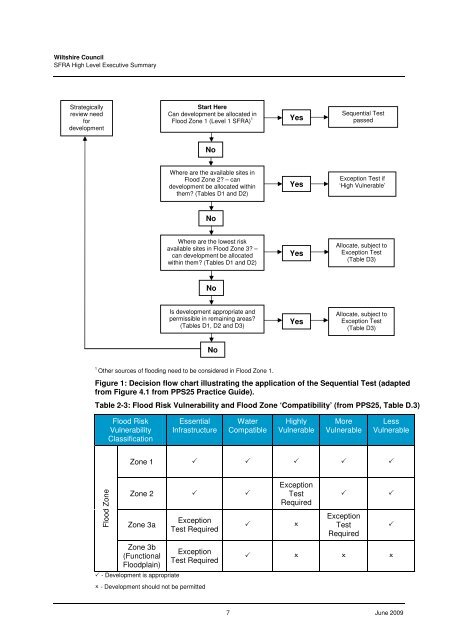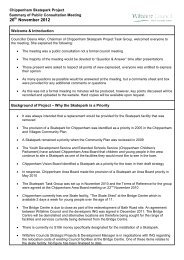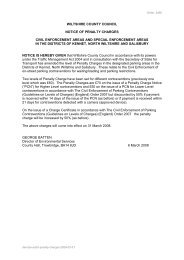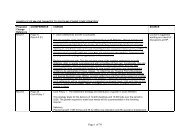Strategic Flood Risk Assessment - Wiltshire Council
Strategic Flood Risk Assessment - Wiltshire Council
Strategic Flood Risk Assessment - Wiltshire Council
You also want an ePaper? Increase the reach of your titles
YUMPU automatically turns print PDFs into web optimized ePapers that Google loves.
Preface and AcknowledgmentsixSome capitalization decisions will cause raised eyebrowson the European side of the Atlantic, where titles arenormally capitalized, for example, Emperor of Austria, asopposed to emperor of Austria or king of Italy. With respectto French titles, this work conforms to the French method,employing lower case for aristocracy, such as comte deProvence. Britons may find such forms as chancellor of theexchequer, leader of the House of Commons, and secretary ofstate for war and the colonies, rather offensive to the eyes;however, in an effort to bridge CMS style and scholarlyconvention I have tried (whether boldly or foolishly) toreach a compromise in favor of historians. It should benoted that the CMS does make concessions to using uppercasefor British aristocratic titles, if not so much for politicaloffices. This work has also deviated in some casesfrom the CMS with respect to the capitalization of Emperor,when referring to Napoleon, as well as with respectto (among others) Revolutionary, Romanticism, Allied, andAllies, the latter in refererence to belligerent states formingpart of a coalition against France. Conferred French titles,such as King of Rome, for Napoleon’s son, and King ofSpain, for Joseph, Napoleon’s brother, also appear capitalized,whereas this is not the case for hereditary titles.Hyphens used in the French language can pose particularproblems for an editor, not least because differentsources identify individuals both with and without hyphensbetween forenames. For example, Marie Louise appearssometimes with, sometimes without hyphens, dependingon the source.Punctuation presented various problems, not leastbecause, like grammar and spelling, it is employed slightlydifferently on either side of the Atlantic. It is of coursesimple enough to use American spelling uniformly, andthus one will not find centre, but center, and caliber insteadof calibre; while instead of whilst; that instead of which;waggon instead of wagon; color instead of colour; towardinstead of towards, and so on. The dominance of American,over British, English in this work is no more apparentthan in the presence of the split infinitive, abhorrent toBritish eyes and ears, yet a common and acceptable featureof English as spoken and written in North America.“To boldly go where no man has gone before” continues toproduce smiles of derision in Britain, and not for reasonsof poor grammar alone. Those accustomed to BritishEnglish will also note that this work follows the recentAmerican practice of dropping hyphens between compoundnouns or with ranks, thus producing such wordssuch antirevolutionary, noncommissioned, and Vice Admiral;still, I have allowed some hyphens to be retained, aswith demi-brigade, pro-royalist, and sans-culotte. The originalorthography for flêche (a V-shaped earthwork) is preferredover the more modern flèche.Where revolutionary refers specifically to the FrenchRevolution it appears capitalized: The French Revolutionaries;a wave of Revolutionary fervor; Revolutionarygovernments in France, and so on. Not so, however, forroyalist, republican, or other descriptive terms whichhave no association with a recognized major politicalmovement.The use of army and Army has been dictated by thefollowing rule: Where discussion focuses on the entire institution,it is capitalized; where it discusses a specific armyin the field or a specific fleet at sea, it is rendered in lowercase. Hence, it may be said that thousands of Irishmen enlistedin the British Army during the course of theNapoleonic Wars, whereas the British army landed in Portugalin 1808. Similarly, the Prussian Army underwent numerousreforms between 1808 and 1813, whereas thePrussian army in 1813 was led by General Gebhard vonBlücher. Readers should also note that where the termRoyal Navy appears, this is invariably a reference to thenaval establishment of Britain, there being no such institution,technically speaking, as the “British Navy,” in thesame way that one may properly refer to the U.S. Army butnot to the “American Army.”Where the names of armies do not always betray theirnationality, they are identified, thus: (French) Army ofItaly; (French) Army of Rome; (French) Army of Batavia;(Russian) Army of Poland; and so on.Personal NamesExcept in the cases of those known better by their aristocraticname, every effort has been made to supply the forenameas well as the surname of every individual mentionedin the text. Yet forenames are sometimes disputedby historians, and even an individual’s entire name can appearin various texts in a bewildering array of combinations,not least in the cases of Claude Perrin Victor andToussaint Louverture.There is also the conundrum of the manner by whichthe leader of France should be identified: whether Buonaparteas in his early years, Bonaparte somewhat later, orNapoleon (or, strictly properly, Napoléon) throughout.Bonaparte is used in the present work for the period untilhis assumption of the Imperial title in 1804, and Napoleonthereafter. Readers should therefore not be surprised tofind that the same person may appear as Bonaparte andNapoleon in the same entry, depending on the periodunder discussion. For obvious purposes of space and redundancy,readers will not find “Bonaparte, Napoleon” inthe “See also” section of the entries. Nor have Napoleonand Josephine been identified as Napoléon and Joséphinewhich, though technically correct, are very rarely renderedas such in an English-speaking context.
















